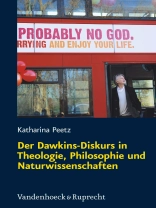Richard Dawkins, evolutionary biologist and best-selling author (‘The God Delusion’) is the most popular religious critic of our time. A well-known slogan of his characterizes religion as the ‘root of all evil’ and as a justification for ‘belief without evidence’. According to Dawkins, the notion of God as a creator is perfectly unnecessary to explain the existence of complex life forms as ourselves. He advocates instead a gene-centered view of Evolution and Nature in general, where natural selection is the key to the appearance of complex life.Moreover, Dawkins goes beyond his field of activity by rejecting the God hypothesis altogether, even as an explanation for the origin of the Universe. Here is where he receives sharp criticism from theologians, arguing that his reasoning is shallow and unprofessional. However, an analysis of the Dawkins discourse illustrates that Dawkins’ theses deserve to be taken seriously. Among other things, he challenges theologians to argue if the hypothesis of a creator God can be truth-apt in the cognitivistic sense.
Over de auteur
Dr. theol. Katharina Maria Peetz ist wissenschaftliche Mitarbeiterin am Institut für Katholische Theologie der Universität des Saarlandes.












